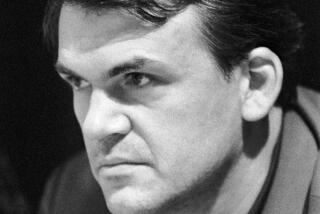BOOK REVIEW / NOVEL : A ‘Lolita’ Tale But Without the Conscience : THE FOLDING STAR <i> by Alan Hollinghurst</i> ; Pantheon Books $24, 422 pages
- Share via
Vladimir Nabokov knew very well that “Lolita” would provoke an enormous scandal upon its U.S. publication in 1958. A teacher so infatuated with a 12-year-old girl that he determines to marry the girl’s mother--imagine!
But the novel works, and brilliantly, for Nabokov knew just how far to push his material, how to make it echo with understanding--of the Western romantic tradition, of the tragi-comedy inherent in obsession, of taboo and vice and self-delusion. Humbert Humbert’s love for Lolita is pathetic and wrong but also powerfully real, and it’s a thrill to watch Nabokov walk the tightrope between pornography and art, indulgence and illumination.
Alan Hollinghurst, author of the widely praised “The Swimming Pool Library,” attempts to walk a similar tightrope in “The Folding Star,” but in this novel, at least, he shows little of Nabokov’s acrobatic skill.
Edward Manners, a gay, well-educated, 32-year-old Englishman, has moved to Belgium to tutor high-school boys Luc and Marcel, and even before leaving Britain had developed, from photographs, something of a crush on Luc. Luc, 17, appears even more beautiful to Edward in person: The teacher is smitten, and soon tells his readers--the novel, like “Lolita,” is narrated in the first person--about his exquisitely unrequited love.
The differences between the “The Folding Star” and “Lolita” soon become evident, however. They may be traced to any number of causes--the rudimentary traditions of the openly gay novel; Hollinghurst’s rambling, somber prose; the gulf between straight and gay culture; the novel’s emphasis of pain over philosophy, due to its taking place in the immediate rather than the distant past. In any case, “The Folding Star” becomes repetitive and confessional rather than engaging and clarifying, proving to be more about sex than love (a charge frequently leveled, wrongly, at “Lolita”).
At first, one thinks the modest, self-conscious Edward will be much easier to identify with than the vain, professorial Humbert Humbert. But in time, Hollinghurst’s hero seems dull, somewhat dim, and surprisingly shallow. He thinks constantly about getting into Luc’s pants and never about the act’s propriety, despite the fact that Edward has been placed in a position of great professional trust ; on a personal level, too, he doesn’t mind deceiving friends about his true motives and desires.
That Edward eventually commits minor criminal acts in pursuit of Luc is altogether appropriate (Humbert Humbert’s love for Lolita, after all, turns him into a killer).
Entwined with the main plot of “The Folding Star” is the story of Paul Echevin, Marcel’s father, who runs a museum dedicated to a Symbolist painter, Edgard Orst, whom he worked for as a youth. Paul befriends Edward for no apparent reason, and ends up telling him of Orst’s obsession with an actress and the painter’s death while hiding from the Germans who occupied Belgium during World War II.
The two stories are brought together, rather awkwardly, by Paul’s confession at the end of the novel of his inadvertent betrayal of Orst.
One of the great themes of literature is how a longed-for goal, once achieved, turns to ashes. In “The Folding Star,” consequently, one expects Luc will either elude Edward altogether or prove a terrible disappointment.
Hollinghurst takes a more sentimental route. Three hundred pages into the book, Edward has his night of bliss with Luc--initiated by the student, no less--who then disappears. Luc shows up again on the novel’s last page, but there’s no happy reunion. Edward describes Luc as “robbed of his beauty,” as “a victim, to be stared at and pitied” . . . yet doesn’t show the slightest sense that he may be responsible in any way for Luc’s plight.
If Edward has been playing shepherd to Luc’s sheep--and that’s the implication of the novel’s title, which refers to a Milton lyric in which a star bids the shepherd gather his flock--he seems not only to be miscast, but to have misconceived the nature of the task.
More to Read
Sign up for our Book Club newsletter
Get the latest news, events and more from the Los Angeles Times Book Club, and help us get L.A. reading and talking.
You may occasionally receive promotional content from the Los Angeles Times.










